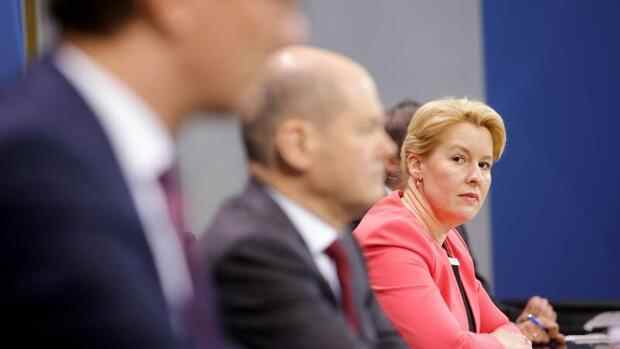Berlin When Prime Minister and Chancellor Olaf Scholz (SPD) meet on Thursday afternoon for federal-state consultations, the agenda is more extensive than it has been for a long time. The corona situation is again on the agenda, but also the Ukraine war and the drastically increased energy prices.
In February, the federal and state governments agreed to analyze the current corona situation and the burden on the clinics again before all drastic corona regulations in Germany are to be lifted on March 20. In view of the sharp increase in the number of new infections, there are serious concerns from the federal states, but also from medical circles, about the extensive easing.
According to negotiating circles, there are fixed criteria under discussion as to when the so-called hotspot rule will apply, with which the federal states can prescribe stricter corona measures. The new Infection Protection Act, which is due to be passed on Friday, only mentions the threat of hospital overload.
Lower Saxony’s Prime Minister Stephan Weil (SPD) had described the rule as unhelpful. “The bar is so high for a hotspot and the process is so cumbersome that it is very difficult to apply this provision,” he told Handelsblatt.
Top jobs of the day
Find the best jobs now and
be notified by email.
Brandenburg’s Prime Minister Dietmar Woidke also expressed the expectation that the federal government would enable the states to react quickly to new corona outbreaks.
“It is in the interest of the entire Federal Republic to take timely measures to prevent the virus from spreading,” the SPD politician told the Handelsblatt on Thursday. “This is the only way to avoid serious economic damage.” The so-called hotspot strategy helps to deal with the pandemic, Woidke added. “But it would be wrong if this gave the impression that the pandemic was over.”
>> Read also: Home office, mask requirement, 3G: which measures apply after March 20th – and which do not
Woidke is convinced that “basic protection” will also be needed in the future. “These are small interventions that are not of great importance to the individual,” explained the head of government. “For me, this includes wearing a protective mask in public spaces.”
The Robert Koch Institute (RKI) reported a new record number of corona infections on Thursday. According to this, there were 294,931 new infections within 24 hours. That was 32,179 more cases than a week ago. The nationwide seven-day incidence rose from 1607.1 the day before to 1651.4, also marking a new high.
Refugee registration required
In addition to the corona situation, dealing with Ukrainian war refugees is also on the agenda of the federal-state meeting. In many places, cities and municipalities are already reaching their limits. The authorities reported 175,000 registered war refugees from Ukraine on Wednesday. The true number is likely to be significantly higher, since the refugees do not have to register.
The federal states still see room for improvement here. It is “essential to register those who arrive quickly and easily,” says a draft decision by the heads of the state and senate chancellery of the federal states for the deliberations, which is available to the Handelsblatt. “The federal and state governments are in a community of responsibility with the municipalities.”
The federal states see Federal Minister of the Interior Nancy Faeser (SPD) as having an obligation “to quickly improve nationwide coordination and distribution in coordination with the interior ministries of the federal states and to quickly define the framework conditions for registration”.
An “orderly and structured distribution process” taking into account the so-called Königstein key is “essential to avoid one-sided burdens on individual countries”. The basis for calculating the Königstein key is the population (one third) and tax revenue (two thirds). The quota is recalculated annually.
The draft resolution also provides that “the existing overloads in individual countries” would be absorbed and cushioned by the international community. The federal government must take on a “strongly coordinating role” here, because due to the free choice of where the refugees are staying, “there have only been limited control instruments” so far.
With agency material
More: This is how Germany is preparing for the Ukraine refugees
